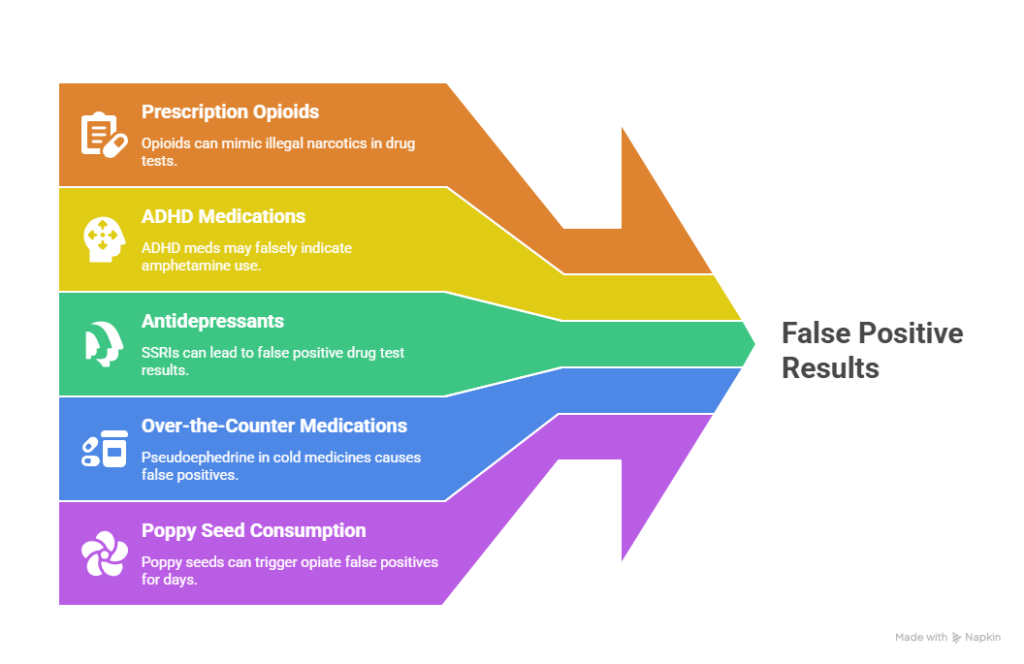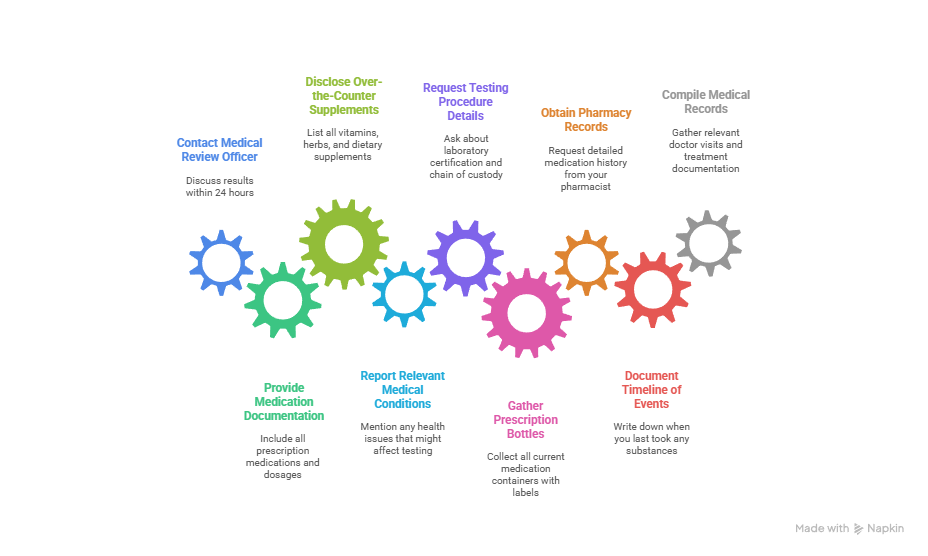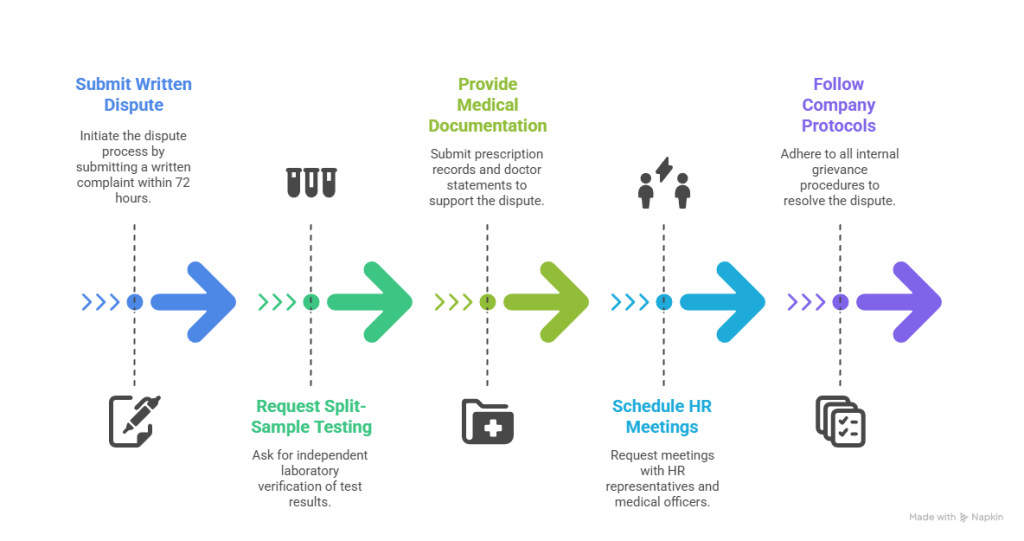False positive drug tests can devastate careers, but California employees have strong legal protections and specific dispute procedures available. Understanding your rights under state employment law and Proposition 64 can help you challenge inaccurate results and protect your livelihood.
Key Takeaways
- California employees have up to 180 days to file a formal dispute with the California Department of Fair Employment and Housing for wrongful termination based on false positive drug tests.
- Medical marijuana users in California are protected under Proposition 64, but employers can still maintain drug-free workplace policies for safety-sensitive positions.
- False positive rates occur in 5-10% of initial drug screenings, making confirmation testing through GC-MS analysis crucial for accurate results.
- Employees have the right to request split-sample testing and independent laboratory verification when disputing drug test results in California.
- Documentation of prescription medications, over-the-counter supplements, and medical conditions is essential for building a successful dispute case.
- California's Fair Employment and Housing Act provides additional protections against discrimination based on disability or medical marijuana use for qualifying conditions.
Understanding False Positive Drug Tests in California Workplaces
False positive drug tests happen when screening results wrongly show illegal substances in an employee's system. California's complex employment laws and evolving marijuana rules under Proposition 64 create unique challenges. Both employers and workers face new difficulties when dealing with drug testing disputes.
The Golden State handles workplace drug testing differently than federal guidelines. Federal law still calls marijuana a controlled substance. However, California's legalization has created unclear areas in employment law. The state's strong worker protection laws give more options for fighting wrong test results than other states.
California employers must follow strict rules when doing drug tests. These include proper chain of custody procedures and confirmation testing requirements. When these rules fail or give wrong results, employees have several legal options available. Workers can dispute false positive drug test California outcomes and protect their employment rights.
Most California employers use initial screening tests that can produce errors. These cheaper tests often give false results from legal medications or foods. The state requires confirmation testing before employers can take action against workers. This extra step helps protect employees from unfair treatment based on wrong results.
California Drug Testing Laws and Employee Rights
State Employment Testing Requirements
California Labor Code Section 1025 sets comprehensive rules for workplace drug testing. Employers must give written notice of testing policies. They must ensure proper sample collection procedures. They must also keep test results confidential. The state requires confirmation testing for all positive results before taking action against employees.
Under California law, employees have specific rights during testing. These include the right to tell about prescription medications that might affect results. Workers can request retesting of samples. They also get protection against discrimination based on lawful off-duty activities. The California Fair Employment and Housing Act makes these protections even stronger.
| Employee Right | Legal Basis |
| Written testing policy notice | Labor Code Section 1025 |
| Confirmation testing requirement | Health and Safety Code |
| Medical disclosure protection | FEHA provisions |
| Retest sample requests | Due process requirements |
Breaking these rules can make test results invalid. It can also give grounds for wrongful termination claims. California courts have consistently ruled that employers must follow proper procedures. This is required to justify negative actions based on drug test results.
Proposition 64 and Workplace Protections
California's Adult Use of Marijuana Act legalized recreational cannabis use. However, the law clearly preserved employers' rights to keep drug-free workplace policies. The law created new complications for medical marijuana patients. It also affects employees in non-safety-sensitive jobs.
Recent California court decisions have started recognizing limited protections for off-duty marijuana use. This especially applies to medical patients. The Ross v. RagingWire Telecommunications case set important rules. It established that employers cannot discriminate against employees only based on positive marijuana tests. This applies when impairment cannot be proven. This changing legal landscape gives new ways to dispute cannabis-related false positives.
Common Causes of False Positive Results
False positive drug tests in California workplaces come from various factors. These range from laboratory errors to legitimate medication use. Understanding these causes helps employees build stronger dispute cases. It also gives employers insights into testing limitations.
Laboratory contamination is one of the most serious causes of false positives. Testing facilities sometimes fail to maintain proper protocols. Cross-contamination between samples can produce wrong results. California requires certified laboratories to follow strict quality control measures. However, violations still happen regularly across the state.
Medical conditions and prescription medications often trigger false positive results. Common problems include prescription opioids that can cause false positives for illegal narcotics. ADHD medications may trigger amphetamine false positives. Some antidepressants can cause false positive results. Over-the-counter medications like cold medicines containing pseudoephedrine also cause issues. Even poppy seed consumption can trigger opiate false positives for days.

- Prescription opioids: Can cause false positives for illegal narcotics
- ADHD medications: May trigger amphetamine false positives
- Antidepressants: Some SSRIs can cause false positive results
- Over-the-counter medications: Cold medicines containing pseudoephedrine
- Poppy seed consumption: Can trigger opiate false positives for days
These issues show why confirmation testing is important. Proper medical review officer evaluation is also crucial in California's drug testing programs.
Step-by-Step Dispute Process for California Employees
Immediate Actions After Receiving Results
Acting quickly after getting a positive drug test result is crucial for protecting your rights under California law. The first 24-48 hours are critical for keeping evidence safe and starting the dispute process effectively. Taking proper immediate steps can significantly impact the success of your dispute case.

- Contact Medical Review Officer immediately: Discuss results within 24 hours of notification
- Provide complete medication documentation: Include all prescription medications and dosages
- Disclose over-the-counter supplements: List all vitamins, herbs, and dietary supplements
- Report relevant medical conditions: Mention any health issues that might affect testing
- Request testing procedure details: Ask about laboratory certification and chain of custody
- Gather prescription bottles: Collect all current medication containers with labels
- Obtain pharmacy records: Request detailed medication history from your pharmacist
- Document timeline of events: Write down when you last took any substances
- Compile medical records: Gather relevant doctor visits and treatment documentation
California's patient privacy laws protect your right to control medical information disclosure, so compile only relevant documentation that directly relates to potential testing problems.
Formal Dispute Procedures
California employees can pursue multiple dispute paths depending on their employment situation and specific circumstances of their case. The formal dispute process usually begins with internal company procedures before escalating to state agencies or civil lawsuits.

- Submit written dispute: Must meet company deadlines, usually 72 hours
- Request split-sample testing: Ask for independent laboratory verification of results
- Provide medical documentation: Submit prescription records and doctor statements
- Schedule HR meetings: Request meetings with representatives and medical officers
- Follow company protocols: Adhere to all internal grievance procedures
State Agency Complaint Options:
- California Department of Industrial Relations: File workplace violation complaints
- Employment Development Department: Submit wrongful termination claims
- Department of Public Health: Report laboratory procedural violations
- Fair Employment and Housing Department: File discrimination complaints
The success of formal disputes often depends on documentation quality and the specific legal theories pursued in each case.Add to Conversation
Legal Remedies and Compensation in California
California employees who successfully dispute false positive drug tests may get various forms of compensation. They may also receive legal remedies. The state's pro-employee legal environment provides more generous recovery options. This makes it more worthwhile to pursue legitimate claims compared to many other states.
Wrongful termination based on false positive drug tests can result in significant financial recovery. California courts regularly award back pay and front pay. They also award emotional distress damages and attorney's fees in successful cases. The state's lack of damage caps in employment cases means substantial awards are possible. This applies to employees who can prove their cases.
Beyond money damages, California law provides other remedies. These include reinstatement and expungement of personnel records. Injunctive relief requiring policy changes is also available. These remedies can be particularly valuable for employees seeking to rebuild their careers after false positive incidents.
| Remedy Type | Typical Range | Legal Basis |
| Back pay/wages | Full compensation for lost earnings | Labor Code Section 1194 |
| Emotional distress | $10,000-$100,000+ | FEHA provisions |
| Punitive damages | 1-4x compensatory damages | Civil Code Section 3294 |
Successful dispute cases often recover substantial amounts. The exact compensation depends on individual circumstances and lost wages.
Prevention Strategies for California Workers
Proactive Documentation
California employees can significantly improve their position in potential drug testing disputes. This happens through smart documentation strategies. Keeping detailed records of prescription medications helps build strong cases. Records of medical conditions and workplace interactions also create a strong foundation for challenging wrong results.
Create a complete medication log. Include prescription names, dosages, and prescribing physicians. Add pharmacy information to your records. California's medical privacy laws protect this information from unauthorized disclosure. However, voluntary documentation can support dispute claims. Also keep records of over-the-counter supplements and herbal remedies. Include dietary products that might affect test results.
Document workplace interactions related to drug testing policies. Keep records of training sessions and discussions with supervisors about testing procedures. California's worker protection laws are stronger when employees can show compliance with company policies. Proper notification procedures also help strengthen cases.
Know Your Rights Before Testing
Understanding your rights under California law before drug testing provides crucial protection. This helps against procedural violations and improper results handling. California employees have more extensive rights during testing than workers in many other states.
Pre-testing rights include the right to review written testing policies and procedures. Workers can disclose prescription medications to the Medical Review Officer. They can request information about laboratory certification and procedures.
During testing rights include the right to proper chain of custody procedures. Workers can refuse testing in certain circumstances. They can request witnesses during sample collection.
- Pre-testing rights: Policy review, medication disclosure, laboratory information
- During testing rights: Chain of custody protection, refusal options, witness requests
- Post-testing rights: Split-sample testing, result explanations, independent review
Post-testing rights include requesting split-sample testing. Workers can get a detailed explanation of results and procedures. They also have the right to independent medical review of results.
Working with Medical Review Officers
Medical Review Officers play a crucial role in California's drug testing process. These licensed physicians review positive test results. They determine if legitimate medical explanations exist for positive findings. Understanding how to work effectively with MROs can make the difference in dispute outcomes.
MROs must contact employees before reporting positive results to employers. This gives workers a chance to explain potential medical reasons for positive tests. California law requires this step in certified testing programs. Employees should prepare for MRO calls by gathering relevant medical documentation.
When speaking with MROs, be honest about prescription medications and medical conditions. Provide specific details about dosages and timing. Ask questions about testing procedures and laboratory methods used. Request information about confirmation testing and cutoff levels applied to your sample.
MRO Communication Tips:
- Be prompt: Return MRO calls within 24 hours when possible
- Be prepared: Have prescription bottles and medical records ready
- Be specific: Provide exact medication names, dosages, and timing
- Ask questions: Request details about testing procedures and standards
MROs can change positive results to negative when legitimate medical explanations exist. This prevents employers from receiving reports of positive drug tests.
Laboratory Standards and Chain of Custody
California requires drug testing laboratories to meet strict certification standards. Understanding these requirements helps employees identify potential procedural violations. Chain of custody problems can invalidate test results completely.
Certified laboratories must follow specific collection procedures. Samples must be properly labeled and sealed. Temperature checks verify sample validity. Multiple people must sign chain of custody forms at each step. Any break in this process can void test results.
Employees can request chain of custody documentation during disputes. Look for missing signatures, incorrect dates, or temperature problems. These issues can provide grounds for challenging test results. California courts take chain of custody violations seriously in employment cases.
Common Chain of Custody Problems:
- Missing signatures: Personnel failing to sign transfer documents
- Temperature issues: Samples outside acceptable temperature ranges
- Timing gaps: Unexplained delays in sample processing
- Labeling errors: Incorrect or missing sample identification
Laboratory accreditation also matters in dispute cases. Only certified facilities should handle employment drug testing. California maintains lists of approved testing laboratories that employers should use.
Conclusion
Disputing false positive drug tests in California requires understanding complex state laws and acting quickly to preserve evidence. Workers must also leverage the state's strong protection framework effectively. California employees enjoy more extensive rights and remedies compared to workers in many other states. This makes it worthwhile to challenge wrong results through proper channels. Success depends on proper documentation and following correct dispute procedures. Working with experienced employment attorneys who understand drug testing law helps significantly. With the right approach and supporting evidence, employees can successfully dispute false positive drug test California results. This protects their careers from unfair consequences and maintains their employment rights.
Frequently Asked Questions
How long do I have to dispute a false positive drug test in California?
In California, you typically have 180 days to file a formal complaint with the Department of Fair Employment and Housing for wrongful termination based on false positive results. However, internal company appeals often have much shorter deadlines, sometimes as brief as 72 hours, so immediate action is crucial.
Can I be fired for a false positive drug test in California?
California employers can terminate employees for positive drug tests, but they must follow proper procedures including confirmation testing and medical review. If you can prove the test was false positive due to procedural errors, laboratory mistakes, or legitimate medication use, you may have grounds for wrongful termination claims.
Does medical marijuana use protect me from drug testing in California?
Proposition 64 allows recreational marijuana use but preserves employer rights to maintain drug-free workplaces. Medical marijuana patients have limited protections, particularly in non-safety-sensitive positions, but employers can still enforce testing policies. The law continues evolving through court decisions.
What evidence do I need to dispute a false positive drug test?
Strong dispute cases require prescription medication documentation, pharmacy records, medical condition evidence, and detailed timeline documentation. Chain of custody records, laboratory certification information, and witness statements about testing procedures can also support your case.
Can I request independent retesting of my drug test sample?
Yes, California employees have the right to request split-sample testing at an independent laboratory. This must typically be requested within 72 hours of receiving results, and you may be responsible for testing costs unless the retest proves the original result was incorrect.
What compensation can I receive for wrongful termination due to false positive results?
California employees may recover back pay, front pay, emotional distress damages, attorney's fees, and potentially punitive damages. Successful cases can also result in reinstatement, record expungement, and policy changes. Awards vary significantly based on case specifics and lost earnings.
Additional Resources
- California Department of Fair Employment and Housing - Drug Testing Guidelines
https://www.dfeh.ca.gov/employment/ - California Labor Commissioner's Office - Employee Rights
https://www.dir.ca.gov/dlse/ - Medical Review Officer Certification Board - Find Certified MROs
https://www.mrocb.org/ - California Employment Lawyers Association - Attorney Directory
https://www.cela.org/ - National Institute on Drug Abuse - False Positive Information
https://www.drugabuse.gov/ - California Department of Public Health - Laboratory Certification
https://www.cdph.ca.gov/Programs/OSPHLD/LFS/
Still have questions?
Get in touch with our team today for a personalized demo and discover how our tailored volume pricing and packages can drive results for your business!
How useful was this page?*
Note: your comments are anonymous. We use them to improve the website. Do not include any personal details.
Visit our FCRA Compliance Tool or leave a message here if you need a response.
From the blog Explore the GCheck Content Hub

Employment Credit Checks: 2026 Guide to Legal Compliance and Best Practices
7 Jan, 2026 • 27 min read
I-9 Form Management Systems: Modernizing Employment Eligibility Verification for 2026
6 Jan, 2026 • 19 min read
EEOC Compliance Requirements 2026: Complete Employer Guide to Fair Hiring Practices
29 Dec, 2025 • 24 min readThe information provided in this article is for general informational and educational purposes only and should not be construed as legal advice or a substitute for consultation with qualified legal counsel. While we strive to ensure accuracy, employment screening laws and regulations—including but not limited to the Fair Credit Reporting Act (FCRA), Equal Employment Opportunity Commission (EEOC) guidelines, state and local ban-the-box laws, industry-specific requirements, and other applicable federal, state, and local statutes—are subject to frequent changes, varying interpretations, and jurisdiction-specific applications that may affect their implementation in your organization. Employers and screening decision-makers are solely responsible for ensuring their background check policies, procedures, and practices comply with all applicable laws and regulations relevant to their specific industry, location, and circumstances. We strongly recommend consulting with qualified employment law attorneys and compliance professionals before making hiring, tenant screening, or other decisions based on background check information.

